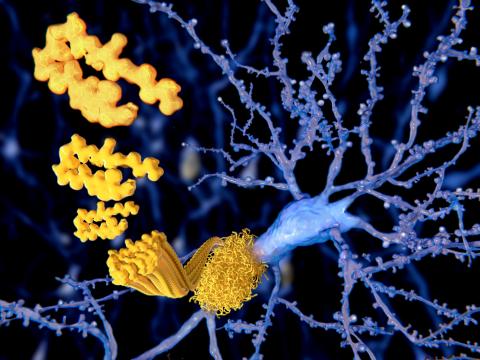Early administration of an anti-amyloid therapy could delay the onset of Alzheimer's disease
The DIAN-TU platform is an initiative to test Alzheimer's disease treatments early, by recruiting people with a mutation that leads to developing the disease in the future. One of the trials with the anti-amyloid drug gantenerumab ended without reaching the targets. However, a continuation of the study in 73 patients suggests - for the first time, according to the authors - that long-term, high-dose treatment given some time before symptoms develop could delay the onset of the disease. The results are published in the journal The Lancet Neurology.

Morató - DIAN (en)
Xavier Morató
Director of Clinical Trials at Ace Alzheimer Center Barcelona
The DIAN-TU platform was a key revolutionary approach to structuring such complex research as the analysis of therapies in familial cases of Alzheimer's disease.
Current evidence indicates that disease-modifying treatments have greater efficacy in patients at earlier stages of the disease (and with less tau pathology in the brain). Phase 3 trials are currently evaluating drugs that eliminate amyloid much more effectively in the preclinical population with sporadic (non-familial) Alzheimer's disease. This is the case of trials with monoclonal antibodies such as donamemab or lecanemab, which will be completed in 2027 and 2028, respectively.
The study now published is conducted with a molecule with worse pharmacodynamic properties than other molecules (e.g., lecanemab, donamemab, trontinemab, remternetug). The difficulty of recruitment for these studies in patients with familial Alzheimer's disease hampers the ability to observe significant differences between groups.
Eloy- DIAN (EN)
Eloy Rodríguez Rodríguez
Head of the Neurology Department at the Marqués de Valdecilla-IDIVAL University Hospital and Associate Professor of Medicine in the Department of Medicine and Psychiatry at the University of Cantabria
This is a very interesting study. It is an open phase extension of a trial that was negative (mainly due to low progression of the subjects included) in patients carrying a mutation that conditions the development of Alzheimer's disease at a young age.
These mutations are rare and so the trial included both mildly symptomatic and asymptomatic people in order to reach a number of subjects that is still low, but with which more can be done, although it makes interpretation more difficult. This open phase was prematurely suspended when the results of gantenerumab in sporadic Alzheimer's disease (Graduate I and II studies) were published, by decision of the sponsor.
Methodologically there are things that can be criticized: how the groups have been made for the analysis according to whether or not they had received gantenerumab during the previous trial, how the dose escalation is done, the early suspension of the trial, etc., (the authors themselves rightly identify this in the limitations of the study). This makes it difficult to obtain 'definitive' data by complicating statistical analysis and reducing the possibility of significant findings.
My conclusions:
Gantenerumab, a monoclonal antibody that has shown a modest reduction in brain amyloid in both this population and in sporadic Alzheimer's, when given at high doses and on a prolonged basis (mean of eight years) in preclinical stages of the disease (asymptomatic but carriers of the mutation) reduces the risk of clinical progression relative to controls. This had not been described so far with any of the drugs that had been tested. These are indications that the natural course of the disease is modified. It remains to be seen what happens when more potent anti-amyloid drugs are used.
In addition to the clinical benefit in the lower risk of progression in this group of treated subjects, a consistent biological response is observed in the biomarkers measured, indicating that anti-amyloid treatment, even with a moderately potent drug, modifies biological aspects of the disease.
The keys to these findings, in my view, are the very early onset (presymptomatic phase) and the prolonged duration of treatment. This is probably necessary in this population because of the genetic nature of the disease, but it may also be because the anti-amyloid effect of gantenerumab is modest and needs more time to significantly reduce brain amyloid. The point of early treatment, in the presymptomatic phase, seems to me extrapolable to sporadic Alzheimer's, pointing out that the earlier we treat in the disease the more we can change it, but the issue of treatment duration I would not dare to extrapolate to sporadic Alzheimer's disease (because of the drug used and the genetic mechanism present in this particular population).
Therefore, the data, although very valuable because it deals with a special population, only allow us to draw partial conclusions. But they do give us clues as to what can happen in this group of mutation carriers and in sporadic Alzheimer's disease, and the importance that treatment can have in very early stages, even before the onset of symptoms, in Alzheimer's disease. This will be a key point in the coming years.
The findings will have to be confirmed in other randomized clinical trials with more potent anti-amyloid drugs, such as lecanemab and donanemab or other new generation drugs. Trials are already underway with these treatments in pre-symptomatic populations, both with genetic mutations and in sporadic Alzheimer's disease. This will be a key point in the coming years.
Conflicts of interest: “I participated as an investigator in the Graduate I and II studies, although this does not influence my opinion”.
Bateman et al.
- Research article
- Clinical trial
- People



